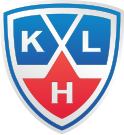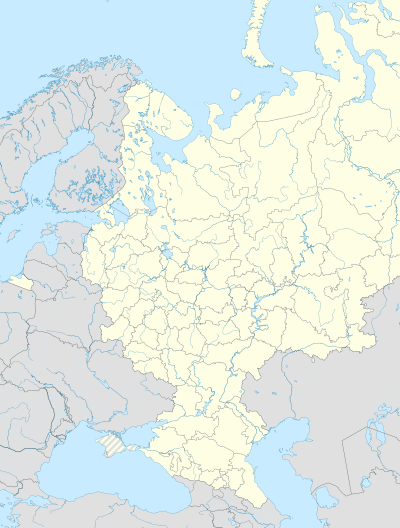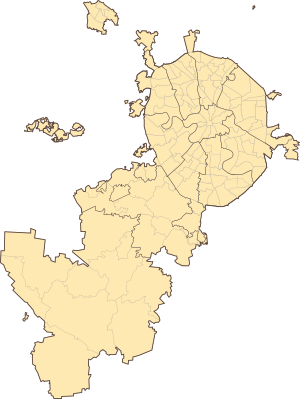This article needs to be updated. (March 2024) |
The Kontinental Hockey League (KHL; Russian: Континентальная хоккейная лига (КХЛ), romanized: Kontinental'naya khokkeynaya liga) is an international professional ice hockey league founded in 2008. It comprises member clubs based in Russia (20), Belarus (1), Kazakhstan (1) and China (1) for a total of 23 clubs.
| Current season, competition or edition: | |
 | |
| Formerly | Russian Superleague (RSL) |
|---|---|
| Sport | Ice hockey |
| Founded | 2008 |
| President | Alexei Morozov |
| Motto | Хоккей – наша игра! (Hockey is our game!) Хакей – наша гульня! Хоккей – біздің ойын! 冰球,就是我们的生活![1] |
| No. of teams | 23 |
| Country |
|
| Most recent champion(s) | Metallurg Magnitogorsk (3rd title) |
| Most titles | HC CSKA Moscow Ak Bars Kazan Metallurg Magnitogorsk (3 titles each) |
| TV partner(s) | KHL TV, KHL TV Prime (Russia (as part of the NTV Plus package), Russia and international through KHL's website) |
| Related competitions |
|
| Official website | KHL.ru |
It was considered in 2015 to be the strongest professional ice hockey league in Europe and Asia, and tied for the second-strongest in the world with the American Hockey League behind North America's National Hockey League.[2][3] The KHL had in 2017 the highest total attendance in Europe with 15.32 million spectators in the regular season[4] and third-highest average attendance in Europe with 26,121 spectators per game in the regular season.[5] The Gagarin Cup is awarded annually to the league's playoff champion at the end of each season. The title of Champion of Russia is given to the highest-ranked Russian team.[6]
History edit
History edit

The league formed from the Russian Superleague (RSL) and the champion of the 2007–08 season of the second division, with 24 teams: 21 from Russia and one each from Belarus, Latvia, and Kazakhstan. The teams were divided into four divisions, based on the performance in previous seasons.[citation needed]
The start of the fourth season was overshadowed by the 2011 Lokomotiv Yaroslavl plane crash on 7 September 2011 in which almost all members of the team Lokomotiv Yaroslavl lost their lives shortly after take-off for their flight to their season-opening game in Minsk. The Opening Cup game in Ufa, which was already underway when news of the disaster arrived, was suspended. In memory of the disaster, 7 September remained a day of mourning on which no KHL regular-season games took place,[7] until after the 2017–18 KHL season. Journalist Vsevolod Kukushkin acted as the first press secretary for the league, after it evolved from the Superleague.[8]
After the 2022 Russian invasion of Ukraine, the National Hockey League suspended operation of its Memorandum of Understanding with the KHL.[9] An NHL memo instructed NHL teams to "immediately cease all dealings [direct or indirect] with the KHL and KHL Clubs [and all representatives of both], as well as with player agents who are based in and continue to do business in Russia."[9]
Team changes edit
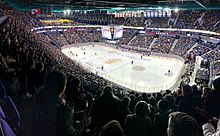
2009–2014 edit
In the 2009–10 season, Avtomobilist Yekaterinburg joined the KHL and Khimik Voskresensk was transferred to a lower league. In the 2010–11 season, Yugra Khanty-Mansiysk joined the league.
After several attempts by teams from Central Europe and Scandinavia to join the KHL, expansion beyond the borders of the former Soviet Union was finally realized in 2011. Lev Poprad, a newly founded team based in Poprad, Slovakia was admitted to the league. But after only one season, Lev was replaced by a team of the same name, Lev Praha, from Prague, Czech Republic, while Slovan Bratislava from Bratislava, Slovakia and Ukraine's Donbass from Donetsk joined the KHL as expansion teams for the 2012–13 season.[10] Lev and Slovan qualified for the playoffs in their first KHL season.
In 2013, Medveščak from Zagreb, Croatia, previously playing in the Austrian Hockey League, and Russian expansion team Admiral Vladivostok joined the league, thus expanding the league even further.[11] The league comprised 28 teams during the 2013–14 season, of which 21 were based in Russia and 7 located in the other countries.
In 2014, Finnish team Jokerit from Helsinki, Lada Togliatti (which previously played in the league), and newly created team HC Sochi joined the league.[12] However, HC Donbass did not play in the league for the 2014–15 season, due to the Russian intervention in Ukraine, but had intended to rejoin later.[13] Two other teams, Lev Praha and Spartak Moscow, also withdrew from the 2014–15 season due to financial problems.[14][15]
2015–2019 edit
Prior to the 2015–16 season, Atlant Moscow Oblast withdrew from the KHL due to financial issues, while Spartak Moscow returned after a one-year hiatus.[16] The newly created Chinese club HC Kunlun Red Star from Beijing was admitted for the 2016–17 season.[17]
Prior to the 2017–18 season, Medveščak Zagreb withdrew from the league to rejoin the Austrian league and Metallurg Novokuznetsk was sent down to the VHL.[18]
After the end of the 2018–19 season, HC Slovan Bratislava withdrew from the KHL due to financial issues to rejoin the Slovak Tipsport Liga.[19]
2020–present edit
On 24 February 2022, Finnish club Jokerit announced the team would withdraw from the league for the remainder of the season, including the playoffs, due to the 2022 Russian invasion of Ukraine.[20] On 27 February 2022, Latvian club Dinamo Riga announced that they too would withdraw for the same reasons.[21] In the 2023/24 season HC Lada Togliatti rejoined the KHL.
Season structure edit
Since 2009, the league has been divided into East and West conferences. In the current season, both conferences include 12 teams divided into two divisions of 6 teams. Each team plays four games against each division opponent (20), three games against each non-division conference opponent (18), and two games against each non-conference opponent (24) for a total of 62 games.[22]
The eight top-ranked teams in each conference receive playoff berths. Within each conference quarterfinals, semifinals and finals are played before the conference winners play against each other for the Gagarin Cup. The division winners are seeded first and second in their conference, based on their regular-season record. All playoff rounds are played as best-of-seven series. In each round, the top-seeded remaining team is paired with the lowest-seeded team, etc.[23]
In the 2012–13 season, the Nadezhda Cup (Cup of Hope) was introduced, a consolation tournament for the teams who did not qualify for the playoffs. The winning team in the tournament wins the first overall pick in the KHL Junior Draft. The tournament is intended to extend the season and help maintain interest in hockey in the cities of these teams, and help players of national teams prepare for upcoming World Championships.[24]
Teams edit
 : Bobrov,
: Bobrov,  : Tarasov,
: Tarasov,  : Moscow and Moscow Oblast: see separate Map)
: Moscow and Moscow Oblast: see separate Map) :Kharlamov,
:Kharlamov,  : Chernyshev), except for
: Chernyshev), except for  Beijing, which is in the Western conference
Beijing, which is in the Western conference- ^ Due to the on-going travel restrictions against the COVID-19 pandemic, Kunlun Red Star determined that they would be unable to play in Cadillac Arena situated in Beijing, China for the 2020–21 season. In August, the club signed a contract to play out of Mytishchi Arena located on the outskirts of Moscow.
| Name | City | Arena | Creation | Seasons |
|---|---|---|---|---|
 Khimik Voskresensk Khimik Voskresensk | Voskresensk, Moscow Oblast | Podmoskovie Ice Palace | 2005 | 2008–2009 |
 HC MVD HC MVD | Balashikha, Moscow Oblast | Balashikha Arena | 2004 | 2008–2010 |
 Lev Poprad Lev Poprad | Poprad, Slovakia | Poprad Ice Stadium | 2010 | 2011–2012 |
 HC Donbass HC Donbass | Donetsk, Ukraine | Druzhba Arena | 2001 | 2012–2014 |
 Lev Praha Lev Praha | Prague, Czech Republic | Tipsport Arena | 2012 | 2012–2014 |
 Atlant Mytichtchi Atlant Mytichtchi | Mytishchi, Moscow Oblast | Mytishchi Arena | 1953 | 2008–2015 |
 Metallurg Novokuznetsk Metallurg Novokuznetsk | Novokuznetsk, Kemerovo Oblast | Kuznetsk Metallurgists Sports Palace | 1949 | 2008–2017 |
 Medveščak Zagreb Medveščak Zagreb | Zagreb, Croatia | Dom Sportova | 1961 | 2013–2017 |
 Yugra Khanty-Mansiysk Yugra Khanty-Mansiysk | Khanty-Mansiysk, Khanty-Mansi Autonomous Okrug | Arena Ugra | 2006 | 2010–2018 |
 Slovan Bratislava Slovan Bratislava | Bratislava, Slovakia | Ondrej Nepela Arena | 1921 | 2012–2019 |
 Jokerit Helsinki Jokerit Helsinki | Helsinki, Finland | Hartwall Arena | 1967 | 2014–2022 |
 Dinamo Riga Dinamo Riga | Riga, Latvia | Arena Riga | 2008 | 2008–2022 |
Players edit
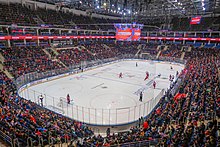

Though now not as restrictive in maintaining an exclusively Russian composition of players and teams, Russian teams are still not allowed to sign more than five foreign players, while non-Russian teams must have at least five players from their respective countries. Foreign goaltenders on Russian teams are subject to a limit regarding their total seasonal ice time.[25]
Prior to the inaugural season, several KHL teams signed several players from the NHL.[26] A dispute between the two leagues over some of these signings was supposed to have been resolved by an agreement signed on 10 July 2008, whereby each league would honor the contracts of the other, but the signing of Alexander Radulov was made public one day after the agreement (though it was actually signed two days prior to the agreement taking effect),[27] leading to an investigation by the International Ice Hockey Federation.[28] On 4 October 2010, the conflict between the leagues was settled when both signed a new agreement to honor one another's contracts.[29]
The league set up rules for the NHL lockout which lasted from 16 September 2012 to 12 January 2013. According to the special regulations, each KHL team was allowed to add up to three NHL players to its roster, with only one foreign player allowed.[30] More than 40 NHL players, the majority of them Russians, played in the KHL during the lockout.
KHL players are represented by the Kontinental Hockey League Players' Trade Union.[31]
After the 2022 Russian invasion of Ukraine, some non-Russian players elected to leave their teams, at the risk of forfeiting their salaries. The departing players included former NHL players Markus Granlund, Nick Shore, Geoff Platt, Kenny Agostino, Teemu Hartikainen, Philip Larsen, Sakari Manninen, Harri Säteri, Jyrki Jokipakka, Joakim Nordström, Lucas Wallmark, and Juho Olkinuora.[9][32]
Nationalities of players edit
This article needs to be updated. (August 2021) |
During the 2013–2014 season, players representing 16 nations played at least one game in the KHL.[33] A player's nationality is for various reasons sometimes ambiguous. For the table presented below, the nationality "is determined based on the last country that the player represented in international competition. If a player has never played for a national team, usually the country of birth is chosen as the player nationality, unless there is strong evidence indicating otherwise".[34] For players born in former Soviet republics, the situation is often more complex due to dual citizenship and naturalization. Therefore, a list of players born in Ukraine gives case-by-case details for some of those players. In some cases, players can change their nationality registration with the league on a year-by-year basis, and their nationality with the league may not match that of their International Ice Hockey Federation registration. Non-Russians represented about 30–35% of the KHL players and were mostly Central European, Nordic, and North American. In 2015–16, more than 950 players played in the league (see table below). Russian teams are limited to a maximum of 5 foreign players per squad.[35]
| Country (current number of teams) | Players active (2012–13)[36] | Players active (2013–14)[37] | Players active (2014–15)[38] | Players active (2015–16)[39] | Players active (2016–17)[40] | Players active (2017–18)[41] | Players active (2018–19)[42] | Players active (2019–20)[43] | Players active (2020–21)[44] |
|---|---|---|---|---|---|---|---|---|---|
 Austria Austria | — | — | — | — | — | — | — | — | 1 |
 Belarus (1 team) Belarus (1 team) | 33 | 43 | 50 | 41 | 38 | 39 | 35 | 49 | 50 |
 Belgium Belgium | — | — | — | — | 1 | — | — | — | — |
 Canada Canada | 32 | 63 | 51 | 35 | 53 | 51 | 58 | 60 | 47 |
 China (1 team) China (1 team) | — | — | — | — | 3 | — | 2 | — | — |
 Croatia Croatia | 1 | 4 | 4 | 4 | 6 | 2 | 1 | — | — |
 Czech Republic Czech Republic | 45 | 47 | 29 | 35 | 35 | 33 | 28 | 20 | 23 |
 Denmark Denmark | — | 1 | 2 | 4 | 3 | 5 | 6 | 4 | 3 |
 Finland Finland | 40 | 37 | 51 | 48 | 51 | 42 | 45 | 46 | 54 |
 France France | — | — | 1 | 1 | 2 | — | 3 | 1 | 1 |
 Germany Germany | 1 | 2 | 2 | 1 | — | — | — | 2 | 3 |
 Italy Italy | — | — | — | 2 | 2 | — | — | — | — |
 Israel Israel | — | — | — | — | — | 1 | — | — | — |
 Kazakhstan (1 team) Kazakhstan (1 team) | 33 | 37 | 34 | 40 | 37 | 38 | 33 | 38 | 30 |
 Latvia Latvia | 35 | 34 | 29 | 34 | 33 | 33 | 29 | 35 | 34 |
 Lithuania Lithuania | — | — | — | — | — | 2 | 1 | 1 | — |
 Norway Norway | 3 | 3 | 3 | 1 | — | 1 | — | — | — |
 Russia (19 teams) Russia (19 teams) | 569 | 599 | 613 | 657 | 678 | 661 | 596 | 586 | 659 |
 Slovakia Slovakia | 53 | 44 | 32 | 28 | 28 | 24 | 24 | 6 | 6 |
 Slovenia Slovenia | — | 2 | 4 | 4 | 4 | 4 | 3 | — | — |
 South Korea South Korea | 1 | 1 | — | — | — | — | — | — | — |
 Sweden Sweden | 24 | 21 | 27 | 26 | 23 | 25 | 24 | 30 | 33 |
 Switzerland Switzerland | — | — | — | — | 1 | — | — | 1 | — |
 Ukraine[a] Ukraine[a] | 12 | 17 | 2 | 2 | 4 | 2 | — | — | — |
 United States United States | 14 | 21 | 26 | 20 | 25 | 20 | 20 | 14 | 17 |
| Total | 896 | 976 | 960 | 983 | 1,027 | 983 | 908 | 893 | 961 |
Trophies and awards edit

The winner of the playoff is awarded the Gagarin Cup. The highest placed Russian team is awarded the Championship of Russia. The team ranked first in the standings after the regular season, i.e. the winner of the regular season, is awarded the Continental Cup[45] (Russian: Кубок Континента, Kubok Kontinenta). The winners of the conference finals are awarded the Eastern Conference Champion Cup (Russian: Кубок Победителю конференции Восток, Kubok Pobeditelyu konferentsii Vostok) and the Western Conference Champion Cup (Russian: Кубок Победителю конференции Запад, Kubok Pobeditelyu konferentsii Zapad).[46]
The KHL presents annual awards to its most successful players. The KHL also awards the Opening Cup annually to the winner of the first game between the Gagarin Cup winner and the runner-up of the previous season. On 10 September 2011, three days after the 2011 Lokomotiv Yaroslavl plane crash, the KHL head office decided to honor the deceased in the 2011 Opening Cup.[47] The League gives the Andrey Starovoytov Award annually to its referees of the year, also called the "Golden Whistle".[48]
Seasons overview edit
Statistics edit
Single season records edit
Regular season edit
| Record | Name | Season | |
|---|---|---|---|
| Points | 89 |  Nikita Gusev (Dynamo Mo.) Nikita Gusev (Dynamo Mo.) | 2023-24 |
| Goals | 48 |  Sergei Mozyakin (Magnitogorsk) Sergei Mozyakin (Magnitogorsk) | 2016–17 |
| Assists | 66 |  Nikita Gusev (Dynamo Mo.) Nikita Gusev (Dynamo Mo.) | 2023-24 |
| Shots on goal | 253 |  Darren Dietz (Barys) Darren Dietz (Barys) | 2018–19 |
| Plus/minus | +48 |  Vladislav Gavrikov (SKA) Vladislav Gavrikov (SKA) | 2018–19 |
| Penalty minutes | 374 |  Darcy Verot (Vityaz) Darcy Verot (Vityaz) | 2009–10 |
| Wins | 38 |  Jakub Kovář (Avtomobilist) Jakub Kovář (Avtomobilist) | 2018–19 |
| Shutouts | 13 |  Alexei Murygin (Lokomotiv) Alexei Murygin (Lokomotiv) | 2015–16 |
Playoffs edit
| Record | Name | Season | |
|---|---|---|---|
| Points | 33 |  Sergei Mozyakin (Magnitogorsk) Sergei Mozyakin (Magnitogorsk) | 2013–14 |
| Goals | 15 |  Evgenii Dadonov (SKA) Evgenii Dadonov (SKA) | 2014–15 |
 Danis Zaripov (Magnitogorsk) Danis Zaripov (Magnitogorsk) | 2016–17 | ||
| Assists | 20 |  Sergei Mozyakin (Magnitogorsk) Sergei Mozyakin (Magnitogorsk) | 2013–14 |
 Chris Lee (Magnitogorsk) Chris Lee (Magnitogorsk) | 2016–17 | ||
| Shots on goal | 82 |  Evgeny Kuznetsov (Chelyabinsk) Evgeny Kuznetsov (Chelyabinsk) | 2012–13 |
| Plus/minus | +16 |  Dominik Graňák (Dynamo Moscow) Dominik Graňák (Dynamo Moscow) | 2012–13 |
 Chris Lee (Magnitogorsk) Chris Lee (Magnitogorsk) | 2016–17 | ||
| Penalty minutes | 69 |  Maxim Goncharov (Ufa) Maxim Goncharov (Ufa) | 2015–16 |
| Wins | 16 |  Alexander Yeryomenko (Dynamo Moscow) Alexander Yeryomenko (Dynamo Moscow) | 2011–12, 2012–13 |
 Vasily Koshechkin (Magnitogorsk) Vasily Koshechkin (Magnitogorsk) | 2013–14 | ||
 Mikko Koskinen (SKA) Mikko Koskinen (SKA) | 2014–15 | ||
 Emil Garipov (Kazan) Emil Garipov (Kazan) | 2017–18 | ||
 Ilya Sorokin (CSKA Moscow) Ilya Sorokin (CSKA Moscow) | 2018–19 | ||
| Shutouts | 7 |  Lars Johansson (CSKA Moscow) Lars Johansson (CSKA Moscow) | 2020–21 |
Career records edit
Regular season edit
| Record | Name | Years | |
|---|---|---|---|
| Points | 756 |  Sergei Mozyakin (Atlant, Magnitogorsk) Sergei Mozyakin (Atlant, Magnitogorsk) | 2008–2021 |
| Goals | 351 |  Sergei Mozyakin (Atlant, Magnitogorsk) Sergei Mozyakin (Atlant, Magnitogorsk) | 2008–2021 |
| Assists | 506 |  Vadim Shipachyov (Cherepovets, Saint Petersburg, Dynamo Moscow, Ak Bars Kazan) Vadim Shipachyov (Cherepovets, Saint Petersburg, Dynamo Moscow, Ak Bars Kazan) | 2008–2022 |
| Games played | 745 |  Yevgeny Biryukov (Ufa, Magnitogorsk) Yevgeny Biryukov (Ufa, Magnitogorsk) | 2008–2022 |
| Plus/minus | +201 |  Vadim Shipachyov (Cherepovets, Saint Petersburg, Dynamo Moscow, Ak Bars Kazan) Vadim Shipachyov (Cherepovets, Saint Petersburg, Dynamo Moscow, Ak Bars Kazan) | 2008–2022 |
| Penalty minutes | 1088 |  Evgeny Artyukhin (Saint Petersburg, Atlant, CSKA Moscow, Novosibirsk, Dynamo Moscow, Vityaz, Admiral, Neftekhimik) Evgeny Artyukhin (Saint Petersburg, Atlant, CSKA Moscow, Novosibirsk, Dynamo Moscow, Vityaz, Admiral, Neftekhimik) | 2008–2022 |
| Wins | 281 |  Vasily Koshechkin (Togliatti, Magnitogorsk, Cherepovets) Vasily Koshechkin (Togliatti, Magnitogorsk, Cherepovets) | 2008–2022 |
| Shutouts | 73 |  Vasily Koshechkin (Togliatti, Magnitogorsk, Cherepovets) Vasily Koshechkin (Togliatti, Magnitogorsk, Cherepovets) | 2008–2022 |
Playoffs edit
| Record | Name | Years | |
|---|---|---|---|
| Points | 172 |  Sergei Mozyakin (Atlant, Magnitogorsk) Sergei Mozyakin (Atlant, Magnitogorsk) | 2008–2021 |
| Goals | 68 |  Sergei Mozyakin (Atlant, Magnitogorsk) Sergei Mozyakin (Atlant, Magnitogorsk) | 2008–2021 |
| Assists | 104 |  Sergei Mozyakin (Atlant, Magnitogorsk) Sergei Mozyakin (Atlant, Magnitogorsk) | 2008–2021 |
| Games played | 161 |  Yevgeny Biryukov (Magnitogorsk, Ufa) Yevgeny Biryukov (Magnitogorsk, Ufa) | 2008–2021 |
| Plus/minus | +52 |  Danis Zaripov (Kazan, Magnitogorsk) Danis Zaripov (Kazan, Magnitogorsk) | 2008–2021 |
| Penalty minutes | 312 |  Grigori Panin (Kazan, CSKA Moscow, Ufa) Grigori Panin (Kazan, CSKA Moscow, Ufa) | 2008–2021 |
| Wins | 71 |  Vasily Koshechkin (Togliatti, Magnitogorsk, Cherepovets) Vasily Koshechkin (Togliatti, Magnitogorsk, Cherepovets) | 2008–2021 |
| Shutouts | 16 |  Ilya Sorokin (CSKA Moscow) Ilya Sorokin (CSKA Moscow) | 2015–2020 |
KHL's longest match edit
| Match time | Date | Match | Home | Visitor | Result | Overtime goal scorer |
|---|---|---|---|---|---|---|
| 142:09 mins | 22 March 2018 | 5. Conference Semi-Finals | CSKA | Jokerit | 1–2 |  Mika Niemi Mika Niemi |
All-time team records edit
Since its foundation in 2008, 35 different clubs have played in the KHL, with 32 having qualified for at least one postseason. Of the 24 founding teams, only Metallurg Novokuznetsk and Khimik Voskresensk had never qualified for the playoffs (both are no longer in the league). The table gives the final regular-season ranks for all teams, with the playoff performance encoded in colors. The teams are ordered by their best championship results.
|
Attendance statistics edit

Total and average attendance by season, including play-offs:[4]
| Season | Total Attendance | Average Attendance |
|---|---|---|
| 2008–09 | 3,886,948 | 6,233 |
| 2009–10 | 4,223,698 | 6,264 |
| 2010–11 | 4,293,271 | 6,944 |
| 2011–12 | 4,320,908 | 6,861 |
| 2012–13 | 4,775,086 | 6,912 |
| 2013–14 | 5,190,133 | 6,614 |
| 2014–15 | 6,066,093 | 7,405 |
| 2015–16 | 5,875,645 | 7,065 |
| 2016–17 | 5,892,889 | 7,210 |
| 2017–18 | 5,318,175 | 7,005 |
| 2018–19 | 5,644,804 | 7,544 |
| 2019–20 | 5,118,949 | 6,854 |
All-Star Game edit
The Kontinental Hockey League All-Star Game is an exhibition game held annually at the midway point (usually January or February) of the season, with the league's star players playing against each other. Previously played in a "Russian players versus the rest of the world" format, it is now run in a similar format to the NHL All-Star Game, where the four divisions face off in 3v3 matches
See also edit
- Ice Hockey Federation of Russia
- List of Soviet and Russian ice hockey champions
- List of Soviet and Russian ice hockey scoring champions
- List of Soviet and Russian ice hockey goal scoring champions
- List of current KHL team rosters
- Beijing International Ice Hockey League
- Asia League Ice Hockey
- Supreme Hockey League
Footnotes edit
- ^ For further information, see List of Ukrainians in the KHL.
- ^ In the first season, Salavat Yulaev Ufa was the winner of the regular season, but the Continental Cup was not yet awarded.
- ^ Conference semifinals cancelled due to the COVID-19 pandemic
- ^ Includes record of Dynamo Moscow before the merger with HC MVD in 2010
- ^ Did not participate in the 2011–12 season due to the 2011 Lokomotiv Yaroslavl plane crash of 7 September 2011, that killed the entire team
References edit
External links edit
- Official KHL
- Official website
- Kontinental Hockey League on Facebook
- Kontinental Hockey League on Twitter
- Kontinental Hockey League on Twitter (in Russian)
- Kontinental Hockey League's channel on YouTube
- Third party
